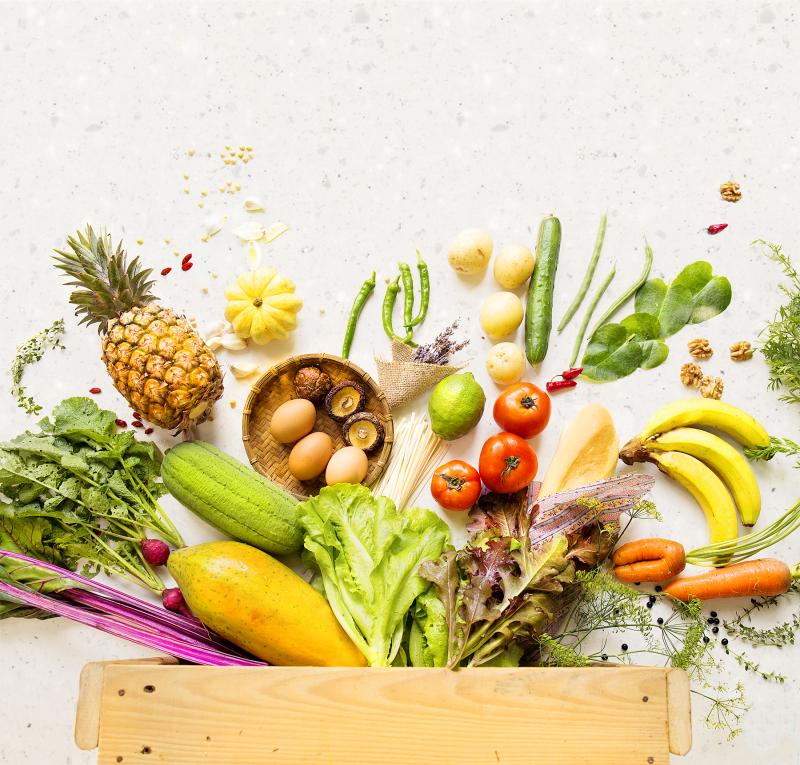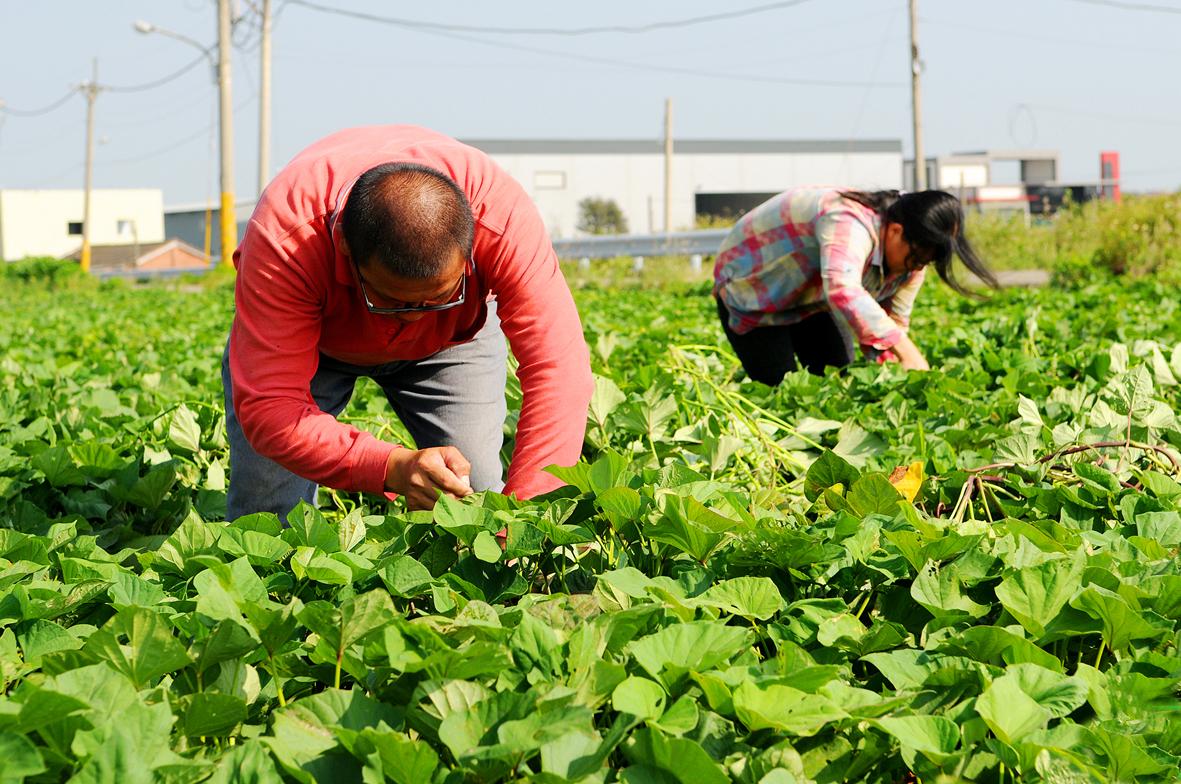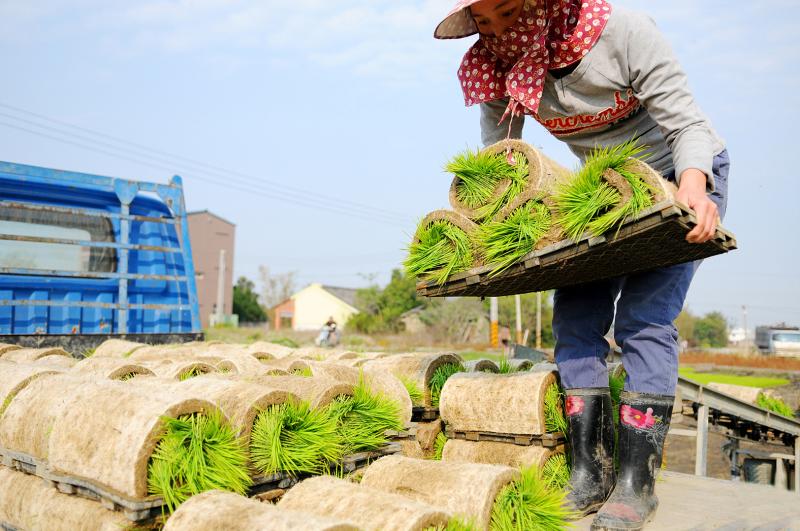Community-supported agriculture (CSA) is a way urban households can obtain healthy produce, while helping to build a more sustainable farming sector in Taiwan.
King Hsin-i’s (金欣儀) transformation from advertising copywriter to social entrepreneur began in 2008, when she visited a rice farmer who practiced pesticide-free agriculture.
“He explained that we have to leave space for other species. At the same time, I realized that while big companies have budgets to spread their messages, farmers have few chances to tell the public about their beautiful concepts,” she recalls.

Photo courtesy of Buy Directly From Farmers
Inspired, she quit her job and traveled throughout rural Taiwan for a year.
King went on to spend time with farmers in Colombia, Israel and Italy, to name a few of the countries she visited. However, the Facebook group she created in 2011 to connect Taiwan’s eco-friendly farmers with consumers willing to buy from them generated uneven results. Some farmers benefited from this attempt to develop CSA, but many were too busy nurturing their crops to develop a social media following.
Recognizing the need for a more professional setup, King established Buy Directly From Farmers (直接跟農夫買, BDFF) in 2014. BDFF’s 150 farmer-partners — up from 100 last year — will during the course of this year offer over 280 different products. Her 10 full-time salaried employees work with agriculturalists of all ages, but put special effort into telling the public about what young farmers are doing.

Photo courtesy of Buy Directly From Farmers
“Young people are the future of agriculture,” King says.
About half of the farmers BDFF cooperates with are certified as organic. Many others do not use synthetic pesticides, but think the organic certification process is too expensive.
BDFF earns commissions of 20 to 30 percent on sales of produce through its Chinese-only Web site, www.buydirectlyfromfarmers.tw. Businessmen who buy from farmers and sell on to supermarkets and food-processing companies take a cut of 40 percent or more, King says.

Photo courtesy of Buy Directly From Farmers
Several BDFF farmer-partners earn 90 percent of their income through BDFF, she adds. According to last year’s BDFF Social Impact Report, more than 75 percent of farmer-partners saw their incomes rise by at least 20 percent as a result of collaborating with the social enterprise.
UNCONVENTIONAL MIDDLEMAN
Unlike a conventional middleman, King does not need to factor in the risk that food will spoil, as all fresh items are shipped by the farmers themselves. Dried items, including native quinoa, rice and tea, are dispatched from BDFF’s warehouse in Taoyuan. BDFF bears all delivery expenses.
BDFF isn’t the first or only CSA entity in Taiwan. Hualien-based Big Wang Vegetable Shop (大王菜舖子) operates a slightly different model. Founder Wang Fu-yu (王福裕) originally planned to take up organic agriculture, but in 2008 he realized he could do more good by helping experienced organic farmers sell their crops.
Unlike other middlemen, Wang is willing to buy small quantities (as little as 3kg) of produce. Customers place orders via the shop’s Chinese-only website, www.buylocal.tw. In recent years, the shop has expanded into downstream activities, buying wheat and soybeans from farmers so rural artisans can make bread, pasta and tofu, boosting incomes in areas where there are few economic opportunities.
So far, this year has been a banner year for BDFF. People afraid of contracting COVID-19 have been cooking at home instead of eating out, and paying greater attention to the quality of the ingredients they use.
Between February and April, King’s team handled a record number of orders.
“Free-range meat, sustainably sourced fish and rice were especially popular. We sold out of rice for the first time ever,” King says. Despite the surge in demand, BDFF’s farmer-partners didn’t raise their prices.
Many consumers want to protect themselves and their families from pesticide residues. However, according to King, concern for the environment is the primary motive for over 60 percent of BDFF’s customers.
LOW CARBON FOOTPRINT
Sustainability is also King’s overriding principle. Growing, packaging and transporting food account for about a quarter of global greenhouse gas emissions. About two thirds of the calories consumed in Taiwan are imported, a lot being shipped across the Pacific. Supporting environmentally-sensitive local farmers can not only help preserve ecosystems, but also increase food security.
When reviewing applications from farmers who hope to sell through BDFF, King first considers their environmental approach.
“Then we ask: ‘Do they grow something that our customers want?’ We may turn them down if we already have a few partners already selling the same thing,” she says.
Occasionally, BDFF seeks out certain types of farm in response to customer requests.
“Before 2018, we didn’t sell any apples. In Taiwan’s climate, growing apples without chemicals is virtually impossible, but we eventually found two farmers able to grow apples with minimal pesticides,” King says.
A few agriculturalists have quit the platform after deciding that eco-friendly farming is more trouble than it’s worth. King parted ways with one farmer who insisted on using nighttime lighting to speed the growth of his passion fruit.
BDFF conducts its own residue tests. For produce from non-organic farmers, the social enterprise’s standards are between four and 10 times stricter than those imposed by the government.
“The most popular products on our Web site are organic fruits, because they’re not as easy to find in stores as organic vegetables,” says King. For apples, jabuticaba, and abiu (which Taiwanese call huangjingguo, 黃金果), demand often exceeds supply.
In King’s opinion, the Warrior Golden Diamond Pineapple (勇士金鑽鳳梨) has been one of the enterprise’s greatest successes. Commercial pressures have forced many indigenous landowners to embrace intensive agriculture, but BDFF is helping a group of Bunun farmers in Taitung County swim against the tide.
“A school principal there contacted us, hoping we could work with some of his students’ parents, to preserve their traditional sustainable farming methods. We told those farmers we could offer high prices for their pineapples, and we paid an instructor to teach them modern eco-friendly techniques,” King says. “Their pineapples are now the best-selling of the five varieties we sell.”
This year, BDFF launched a series of themed food boxes (priced NT$799 to NT$999) which it sends out to subscribers weekly or biweekly. In addition to five to seven different kinds of in-season produce, each box contains recipes. One type of box is for those who want to spend no more than 15 minutes preparing a meal; another encourages families to eat breakfast at home together; a third follows the precepts of traditional Chinese medicine in the way it combines foods that herbalists regard as “warming” or “cooling.”
In Taiwan, as in many prosperous societies, a lot of food is thrown away before it reaches the consumer. King sees BDFF’s food boxes as an opportunity to teach people how to reduce waste — recipes come with tips on the various uses of fruit peelings, for instance — and to sell items that might otherwise be discarded because of their size or appearance.
“Sweet potatoes that are too small to be sold in a supermarket, and cucumbers that aren’t straight, go into our boxes,” she says.
Some of BDFF’s farmer-partners are installing Internet of Things (IoT) technology on their land so they can monitor their fields from afar.
“This also means our customers can be ‘godparents’ and watch online as the food they’ll eat grows,” King says.
King thinks IoT will greatly benefit the agricultural sector, and not just by helping farmers build deeper connections with those who buy their produce.
“Through it, they can instantly know the soil temperature, soil moisture and other variables without having to go to the field,” King says. “This kind of data is essential, as experience counts for less when the climate is changing.”

Growing up in a rural, religious community in western Canada, Kyle McCarthy loved hockey, but once he came out at 19, he quit, convinced being openly gay and an active player was untenable. So the 32-year-old says he is “very surprised” by the runaway success of Heated Rivalry, a Canadian-made series about the romance between two closeted gay players in a sport that has historically made gay men feel unwelcome. Ben Baby, the 43-year-old commissioner of the Toronto Gay Hockey Association (TGHA), calls the success of the show — which has catapulted its young lead actors to stardom -- “shocking,” and says

The 2018 nine-in-one local elections were a wild ride that no one saw coming. Entering that year, the Chinese Nationalist Party (KMT) was demoralized and in disarray — and fearing an existential crisis. By the end of the year, the party was riding high and swept most of the country in a landslide, including toppling the Democratic Progressive Party (DPP) in their Kaohsiung stronghold. Could something like that happen again on the DPP side in this year’s nine-in-one elections? The short answer is not exactly; the conditions were very specific. However, it does illustrate how swiftly every assumption early in an

Inside an ordinary-looking townhouse on a narrow road in central Kaohsiung, Tsai A-li (蔡阿李) raised her three children alone for 15 years. As far as the children knew, their father was away working in the US. They were kept in the dark for as long as possible by their mother, for the truth was perhaps too sad and unjust for their young minds to bear. The family home of White Terror victim Ko Chi-hua (柯旗化) is now open to the public. Admission is free and it is just a short walk from the Kaohsiung train station. Walk two blocks south along Jhongshan

Francis William White, an Englishman who late in the 1860s served as Commissioner of the Imperial Customs Service in Tainan, published the tale of a jaunt he took one winter in 1868: A visit to the interior of south Formosa (1870). White’s journey took him into the mountains, where he mused on the difficult terrain and the ease with which his little group could be ambushed in the crags and dense vegetation. At one point he stays at the house of a local near a stream on the border of indigenous territory: “Their matchlocks, which were kept in excellent order,